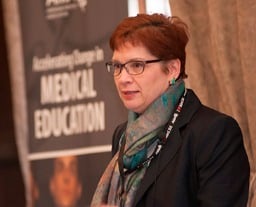What does the doctor of the future look like? Physician educators have some idea, but medical education doesn’t yet broadly reflect what 21st century physicians will need to learn.
Educators at a consortium meeting of the AMA’s Accelerating Change in Medical Education initiative, held last week at the University of Michigan Medical School, discussed their ideas for the physician of the future. Catherine Lucey, MD, vice dean for education at the University of San Francisco School of Medicine (pictured left), gave her take on the most important qualities of future physicians and how medical education needs to change to teach these qualities.
- Inquiry and improvement: “Med ed has always struggled to balance the tension between teaching what is known and teaching how to explore the unknown,” Dr. Lucey said. A key competency for future physicians will be to acknowledge the unknowns and know how to explore them.
- Interdependency: The next generation of physicians won’t have to just work in teams with other health professions—they’ll have to work with individuals from other disciplines and even professionals outside of health care. “We need to help our people understand that they can’t do this alone,” Dr. Lucey said. “We need to teach students, residents and faculty to relinquish the dominance model, where physicians were the boss, and in its place, teach a model that’s a merger of transformational and emergent leadership.”
- Information management: Gone are the days of writing on a clipboard. This is a new era in which technology will allow physicians to integrate, analyze and critically appraise in real time—an environment that will be “cognitively overwhelming,” Dr. Lucey said. “We can’t just say computers are the answer, because computers can fail, and an effective 21st century physician will know that,” she said.
- Interest and insight: As it becomes easier and easier to collect patient data, future physicians will move into different roles. “Relationship-building will become a core aspect of what we need to teach,” Dr. Lucey said. “They’ll spend more time understanding the person in front of them and less time transactionally extracting from them information about their problems.”
- Involvement: And with relationship-building and more personal patient interactions comes increased involvement. “Just making a diagnosis and enacting evidence-based treatment is not sufficient to bring health to our communities,” Dr. Lucey said. Physicians of the future will need to broaden their outlooks to expand the scope and impact of what they’re doing. "The challenges of the 20th century were to add years to life, and we were very successful,” Dr. Lucey said. “The challenges of the 21st century will be to add life to years, and this requires us to work across a wide variety of disciplines and professions.”




